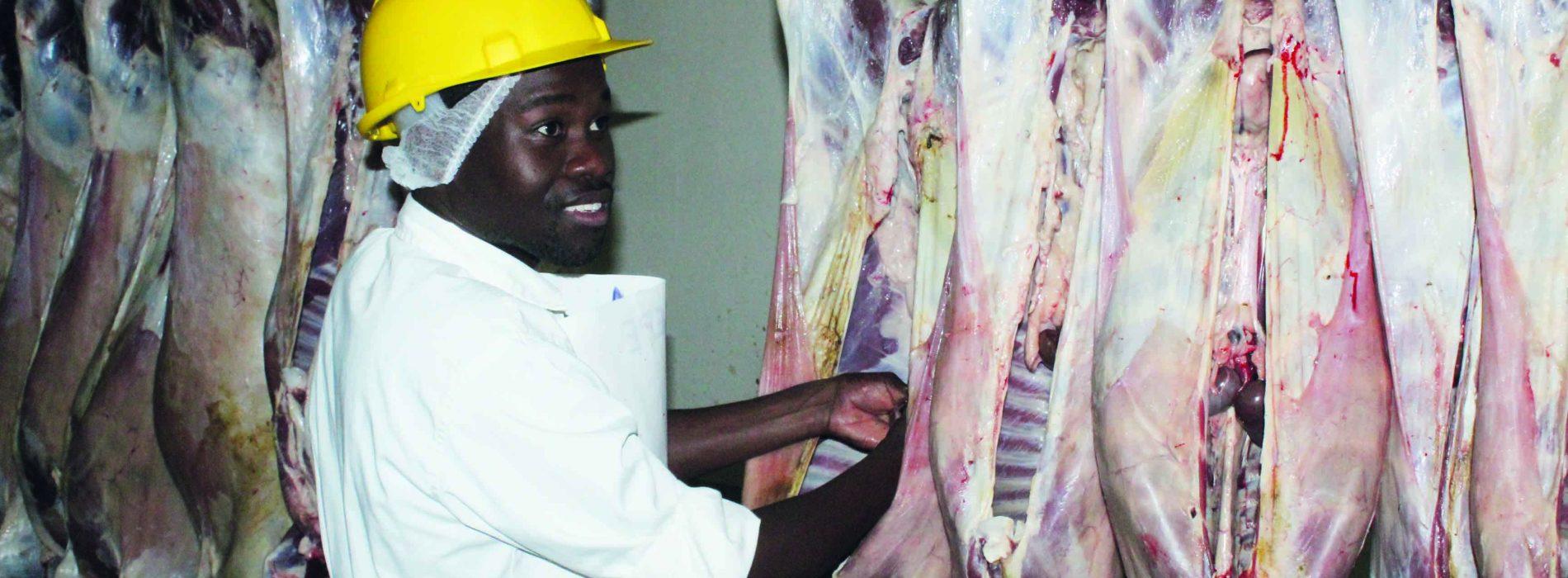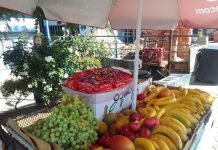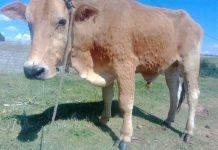Africa-Press – Lesotho. TIGHT competition with wholesalers has reduced the once popular Khubetsoana-based Sakeng Butchery to a shadow of its former self. Sakeng is competing with Meraka-Lesotho, the national abattoir-cum-wholesaler which has a monopoly to import meat into the kingdom, and a Chinese-owned Khubetsoana wholesaler.
Sakeng butchery buys its stock from Meraka-Lesotho to sell to the Khubetsoana community and people from surrounding areas, who can also buy directly from the abattoir at much lower prices.
“Where we sell a kilogram of beef for M95, our competing wholesalers sell for M80, which makes customers leave us to buy from them,” said Teboho Motšephe, the Sakeng butchery manager, adding that they only make meaningful sales on Sundays when their competitors are closed.
He said the butchery used to make over M80 000 in a month in 2017 before the competition went a gear up. Now the butchery considers itself lucky to sell meat worth M20 000 a month.
“Sometimes the sales are less than the amount I pay as rent. I have to take out all my savings to cover up the business costs,” he said.
He said to keep the business running, he has established a meat roasting business (chesa nyama), which is still hardly profitable since he has to buy items such as spices, wood and the sauces.
Motšephe said he lost meat worth M13 000 when competition started heating up. He said he then decided to reduce his stock to minimize losses. He said even the tendering business which was the pillar of his business is no longer viable since all the tenders are been given to Meraka-Lesotho.
He said even the Lesotho Defence Force and the police, who were some of his major customers, are now buying meat from Meraka-Lesotho instead of from local butcheries.
He said they tried to approach other companies to negotiate terms but “all they tell us is that they have been channeled to offer the tender to Meraka-Lesotho”.
He said during the few times that local butcheries get government tenders, payment delays has pulled the business down. “I lost about M200 000 from a government tender,” he said.
Sakeng is just one of small meat suppliers that are reeling from the entrance of Meraka-Lesotho into the retail business. “The national abattoir is a wholesaler while at the same time it is selling to individuals, how are we supposed to compete,” queried Motšephe.
Their anger is still palpable months after the government banned beef imports and announced that Meraka-Lesotho was to be the only licensed slaughter house.
There were howls of protest from meat traders and other stakeholders over what they viewed as unfair competition. “It is also aggressively pushing for contracts to supply meat to government departments like the army,” said Motšephe.
Butcheries say importing a live animal is a bit steep for farmers compared to importing carcasses, which they are not allowed to do at the moment. Local butcheries complain of being neglected by the government, which they accuse of failing to mediate between them and Meraka-Lesotho and wholesalers.
Motšephe, who is also the Secretary-General of the Butchery Association, explained that they have been battling with the issue of Meraka-Lesotho and the wholesalers which have taken over their customers since 2017.
He said they presented their grievances to the Ministry of Small Business Development and the Ministry of Trade but nothing positive has come out of the presentations.
He said that Meraka-Lesotho is responsible for selling the carcasses to wholesalers and butcheries. The wholesalers, he argued, have to package the meat to sell it to the retailers and butcheries, which are supposed to make their money from selling to individuals.
“However, this is not the case anymore because Meraka-Lesotho and the wholesalers are selling to individuals as well. This is hampering our businesses badly,” said Motšephe.
He said after they were banned from importing meat into the country, the butcheries signed an agreement with Meraka-Lesotho for them to buy meat from the company.
In turn, Meraka-Lesotho would stop selling to individuals to give the butcheries space to make some money. However, Meraka failed to comply with the terms of the agreement, said Motšephe, warning of an impending collapse of meat sellers.
He cited some big butcheries in town that include Thanda-Bantu, a once famous Maseru butchery, as examples of businesses closing as a result of the unfair competition.
Others that had owned buildings have since started renting them out to other businesses. As a result, more than 135 Basotho have lost their jobs since 2019, he said.
Covid-19 has worsened the situation, he said, adding that local butcheries are no longer making a profit and the lucky ones were only able to make enough money to pay rent and feed their families.
“We are operating from hand to mouth,” he said. He said some local butcheries have begun diversifying into selling other items to survive. Motšephe said they have lodged their complaints with the Minister of Small Business Development.
He said at the beginning of this year, former Minister of Small Business Development Keketso Sello held a meeting with local butcheries in Hlotse. The then minister promised them that since the ministry did not have the power to set trade policies, he would present the matter to the Minister of Trade and get back to them.
“We have been waiting for the minister’s response up to now,’’ he said.
He added that they even wrote a letter to the Minister of Trade, Dr Thabiso Molapo, and the ministry claimed that this was the first time it was hearing about the matter.
’Maliemiso Rasunyane, the association deputy secretary-general and also a butchery owner, said the wholesalers and Meraka-Lesotho are pushing small-scale operators out of business.
“We are struggling to make a profit. The competition is too tight,” she said.
She said they presented their complaints to several ministers, including to the former Minister of Small Businesses, Chalane Phori, and later his successor Chief Thesele ’Maseribane.
“The only minister we have not talked to is the current Minister of Small Businesses Machesetsa Mofomobe,” Rasunyane said.
Rasunyane said although the permits to buy meat from South Africa are now being issued to individuals, they cannot go to South Africa to buy a few kilograms of meat to sell back home. She said butchery owners have been trying to source pork from local farmers without much success.
“The prices from local farmers are sometimes ridiculous,” she said
She said what is sustaining most butcheries is the chesanyama businesses which they have started within the butchery premises to attract customers.
“We have really gone to a point where some are failing to pay rent. We are fighting with the building owners because we are failing to pay rent,” she said.
Rasunyane said she started with five employees who were supporting their families from the pay they earned, but she has been forced to retrench them. “I am now working with my child,” she said.
The Managing Director of Meraka-Lesotho, Mosito Khethisa, said the company signed an agreement with local butcheries to sell them meat in bulk while the butcheries would only buy from Meraka after the importation of meat into the country was banned.
However, the local butcheries failed to support Meraka-Lesotho and instead supported foreign wholesalers, he said. Khethisa said although, after the agreement, the business stopped selling to individuals, the treatment Meraka-Lesotho got from local butcheries compelled the business “to become flexible” for its own sustainability.
He said Covid-19 has made the situation worse. He said the company was “left with no other options but to retrench half of our employees”. “I do not know what the butcheries want from us,” Khethisa said.
Khethisa said local butcheries are buying cows from local farmers, which they slaughter in their own premises. “Hence Meraka is losing customers. ”
He said Meraka is supplying meat to large supermarkets such as Pick n Pay and has special prices for bulk buyers.
“The local butcheries do not want to support Meraka,” he said. The assistant Public Relations Officer in the Ministry of Trade, Lihaelo Nkaota, said the ministry is seized with the matter.
For More News And Analysis About Lesotho Follow Africa-Press






